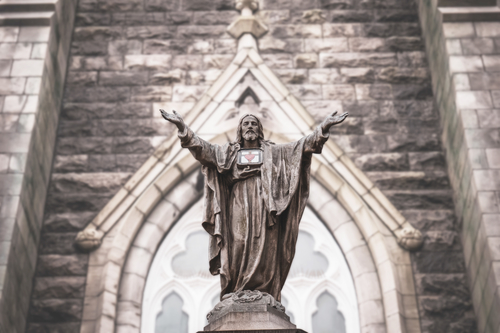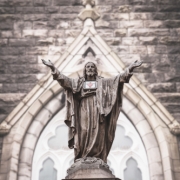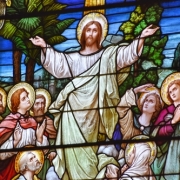“Beyond Casual Contact” – Mark 5:30-32 – July 30 2020
/0 Comments/in Enduring Words for Troubled Times/by David Guzik“As the Rain Comes Down” – Isaiah 55:10-11 – July 29 2020
/0 Comments/in Enduring Words for Troubled Times/by David Guzik“Day and Night” – Psalm 1:2 – July 28 2020
/0 Comments/in Enduring Words for Troubled Times, Uncategorized/by David GuzikDeine Kraft
/0 Comments/in Wöchentliche Andacht/by David GuzikDer Herr aber wandte sich zu ihm und sprach: Geh hin in dieser deiner Kraft! Du sollst Israel aus der Hand der Midianiter erretten! Habe ich dich nicht gesandt? (Richter 6,14)
Zur Zeit der Richter berief Gott einen unscheinbaren Mann namens Gideon, um Israel zu erretten. Gideon wollte den Job nicht, denn er hielt sich nicht für geeignet dafür. Er rang mit Gott und wollte immer wieder eine Bestätigung von Ihm, dass wirklich er derjenige war, der die große Aufgabe hatte, den Widerstand gegen die Midianiter anzuführen. An irgendeinem Punkt in diesem Ringen mit Gott sprach der Engel des HERRN zu Gideon und sagte ihm: Geh hin in dieser deiner Kraft ! Du sollst Israel aus der Hand der Midianiter erretten!

In diesen Umständen war es seltsam, dass Er sagte: Geh hin in dieser deiner Kraft. Doch auch wenn es für die meisten nicht danach aussah, war Gideon schon auf manche Weise kräftig.
Gideon hatte die Kraft der Demütigen. Als der Herr zu Gideon kam, drosch dieser gerade Weizen auf dem Boden der Kelterei. Das war sowohl schwierig als auch demütigend. Weizen wurde normalerweise im Freien gedroschen, so dass der Wind die Spreu wegpusten konnte, und nicht in einem tief liegenden Ort wie eine Weinpresserei. An diesem niedrigen Ort war Gideon kräftig.
Gideon hatte die Kraft der Fürsorgenden, denn er sorgte sich um die Situation Israels. Als der HERR zu Gideon kam, wollte er wissen, warum Israel sich darin befand. Gideon sorgte sich um Israel und wollte etwas tun. In diesem Zustand der Fürsorge war Gideon kräftig.
Gideon hatte die Kraft der geistlich Hungrigen, denn er wollte sehen, wie Gott große Dinge tut. Gideon bat den HERRN: „Man hat von den großen Dingen in der Vergangenheit gehört, doch wir wollen Gottes Größe jetzt sehen.“ Dieser Hunger nach mehr, was Gott tun konnte, war der Auslöser für das, was passieren sollte. In diesem Zustand des Hungers war Gideon kräftig.
Gideon hatte die Kraft der Gelehrigen, denn er hörte auf das, was Gott sagte. Nach dieser Unterhaltung machte sich Gideon daran, Gottes Willen zu tun. Das zeigt, dass er wirklich gelehrig war. An diesem Ort des Lernens war Gideon kräftig.
Mehr als alles andere hatte Gideon die Kraft der Schwäche, und Gottes Stärke ist in den Schwachen mächtig (2. Korinther 12,9). Er wusste, dass er schwach war, und das machte ihn weise genug, um auf Gottes Stärke zu vertrauen. An diesem schwachen Ort war Gideon mächtig.
Menschlich gesehen war Gideon schwach und Gottes Botschaft sarkastisch. Doch wenn man es durch Gottes Weisheit sieht, erkennt man, dass Gideon tatsächlich mit Kraft vorwärts gehen konnte – denn es war die Kraft der Schwachen, die sich auf Gottes Stärke verlassen. Gehe diese Woche in dieser deiner Kraft – doch stelle sicher, dass es wirklich die Kraft des allmächtigen Gottes ist.
“This Same Jesus” – Acts 1:9-11 – July 27 2020
/0 Comments/in Enduring Words for Troubled Times/by David GuzikWhose Church?
/0 Comments/in For Pastors, Preachers, Bible Teachers/by David GuzikDear Pastor, Preacher, or Bible Teacher –
Jesus gives us something to think about after a weekend of serving God and His people:
I will build My church,
and the gates of Hades shall not prevail against it. (Matthew 16:18b)
These words of Jesus give us the first use of the word church in the New Testament. It is the ancient Greek word ekklesia – a “called-out group.” Many people consider the Day of Pentecost in Acts 2 as the “birthday” of the church, but Jesus certainly anticipated the eventually joining of Jewish and Gentile believers together in the one body, the church. The church would be made up of all those who truly trusted in the message just revealed to the disciples: that Jesus is the Christ, the Son of the living God.

This statement of Jesus was a clear claim of ownership – He said, My church. Please note, the church belongs to Jesus. This was also a claim to deity – only God can say the church belongs to Him.
Taken together, the promise is wonderful:
– Jesus brings His people together in common: I will build.
– Jesus builds on a firm foundation: On this rock I will build.
– Jesus builds something that belongs to Him: My church.
– Jesus builds His people into a stronghold: the gates of Hades shall not prevail against it.
Here is a comforting promise: the gates of Hades shall not prevail against it. As dark as things seem sometime, we can trust the promise of Jesus that the forces of death and darkness can’t prevail against or conquer the church.
As you seek to serve Jesus, His people, and a needy world this week, keep it in mind: the church belongs to Jesus. Fundamentally, the church doesn’t belong to the pastor, to the elder or deacon board, or to the congregation. The church certainly doesn’t belong to the government or its leaders.
The church belongs to the One who purchased it with His own blood. Whatever we do for the sake of God’s church, let’s do it with boldness and trust in Him, and do it for His glory and recognition.
Blessings to You in Jesus’ Name – David Guzik
Click Here to Receive Email from David for Pastors, Preachers, and Bible Teachers
Waiting for A Promise
/0 Comments/in Weekly Devotional/by David GuzikAnd being assembled together with them, He commanded them not to depart from Jerusalem, but to wait for the Promise of the Father, “which,” He said, “you have heard from Me; for John truly baptized with water, but you shall be baptized with the Holy Spirit not many days from now.” (Acts 1:4-5)
Right before He ascended to heaven, Jesus gave His disciples important instructions. First, He commanded them not to depart from Jerusalem. At this moment, Jesus had nothing else for the disciples to do other than to wait for the coming of the Holy Spirit (here called the Promise of the Father). Jesus knew that they really could do nothing effective for the Kingdom of God until the Spirit came upon them.

Jesus commanded them to wait.
– To wait means the Father’s promise of the Holy Spirit was worth waiting for.
– To wait means that had a promise the Holy Spirit would come.
– To wait means they must receive the Spirit; they couldn’t create an experience themselves.
– To wait means they would be tested by waiting, at least a little.
It is significant that this coming, filling, and empowering of the Holy Spirit was called the Promise of the Father. Even though there is a sense in which this was now also the promise of the Son of God, there is meaning in the phrase, the Promise of the Father.
– It shows that we should wait for it with eager anticipation, because a Promise of the Father who loves us so much can only be good.
– It shows that it is reliable and can be counted on; a loving and powerful Father would never Promise something that He could not fulfill.
– It shows that this Promise belongs to all His children, since it comes from God as our Father.
– It shows that it must be received by faith, as is the pattern with the promises of God throughout the Bible.
Jesus explained more about this Promise when He added, you shall be baptized with the Holy Spirit. The idea of being baptized is to be immersed in or covered over in something; even as John baptized people in water, so these disciples would be “immersed” in the Holy Spirit.
When would it happen? As Jesus said this right before He ascended to heaven, He added: Not many days from now. They knew that this Promise of the Father would come, but not immediately. It would be days from now, but it would not be not many days.
Jesus had a purpose in not telling them exactly when it would come. One purpose was so the disciples would learn to wait in expectant faith. Even so, we should resist “creating” a move of the Spirit. Instead, we trust the Promise of the Father and have expectant faith regarding the outpouring of the Holy Spirit in our life. The real move of the Holy Spirit is worth it.
Esta tu fuerza
/0 Comments/in Devocional Semanal/by David GuzikY mirándole Jehová, le dijo: Ve con esta tu fuerza, y salvarás a Israel de la mano de los madianitas. ¿No te envío yo? (Jueces 6:14)
En los días de los jueces, Dios llamó a un hombre inesperado llamado Gedeón para liberar a Israel. Gedeón era un hombre que no quería la responsabilidad ni tampoco se pensaba digno del trabajo. Gedeón luchó con Dios, buscando cada vez más confirmación de que él era el que tenía que hacer este gran trabajo de liderar la resistencia contra los madianitas. En algún momento entre todo esto, el ángel de Jehová se le apareció a Gedeón, y le dijo: Ve con esta tu fuerza, y salvarás a Israel de la mano de los madianitas.

Dado las circunstancias, era extraño decir: Ve con esta tu fuerza. Aunque no lo parecía para muchos, Gedeón ya era poderoso en muchos aspectos.
Gedeón tenía la fuerza de los humildes. Cuando Jehová vino a Gedeón, estaba sacudiendo el trigo en el lagar. Esto era difícil y humillante. El trigo se sacudia en lugares abiertos, generalmente en la cima de una colina para que la brisa pudiera volar la paja. El trigo no se trillaba normalmente en un lugar hundido como un lagar. En este humildelugar, Gedeón era poderoso.
Gedeón tenía la fuerza de los bondadosos, porque le importaba el lugar bajo de Israel. Cuando el Señor vino a Gedeón, él quiso saber por qué Israel estaba en un lugar bajo. Gedeón se preocupaba por Israel y quería hacer algo al respecto de su situación actual. En este lugar bondadoso, Gedeón era fuerte.
Gedeón tenía la fuerza de los espiritualmente hambrientos porque quería ver a Dios hacer maravillas nuevamente. Gedeón le dijo a Jehová: Hemos oído de estas maravillas del pasado, pero queremos ver la grandeza de Dios ahora. Esta hambre de más de lo que Dios podía hacer resultó en acción futura. En este lugar hambriento, Gedeón era fuerte.
Gedeón tenía la fuerza de los enseñables, porque escuchó lo que el Señor dijo. Después de esta conversación, Gedeón comenzó a hacer la voluntad de Dios. Esto demostró que realmente era enseñable. En este lugar de enseñanza, Gedeón era fuerte.
Más que nada, Gedeón tenía la fuerza de los débiles, y la fuerza de Dios se perfecciona en la debilidad (2 Corintios 12:9). Él sabía que era débil, y esto lo hizo lo suficientemente sabio como para confiar en la fuerza de Dios. En este lugar de debilidad, Gedeón era fuerte.
Mirándolo con los ojos del hombre, Gedeón era débil y el mensaje de Dios era sarcástico. Pero mirándolo a través de la sabiduría de Dios, vemos que Gedeón realmente podía ir en poder, porque era el poder de los débiles que confiaban en la fuerza de Dios.
Esta semana, ve con esta tu fuerza, solo asegúrate de que sea realmente la fuerza de tu poderoso Dios.




